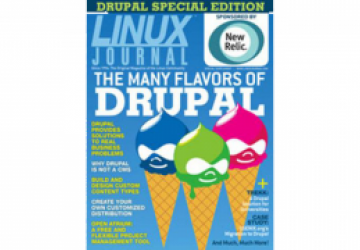Drupal Special Edition

As Linux Journal's resident Drupal nerd, I could not be more pleased to bring you this special Drupal issue. Drupal really is everywhere these days, and it's available in more "flavors" than most people in the Open Source community are aware of. So in the interest of spreading awareness about my favorite and ever-growing open-source project, we hope you'll find this special issue both informative and inspiring.
I see a lot of parallels between Drupal and Linux, and not just because "distributions" are such a significant part of Drupal's current landscape. Like Linux and the Linux community, I see both the Drupal software and the Drupal community embracing the fact that no one solution is right for everyone's problem. By maintaining the flexibility of the platform, scratching one's own itch can have tremendous benefits for all. To illustrate this, we've put together an issue full of information about some products that have come to fruition as a direct result of Drupal's flexibility, as well as information on how you can take advantage of the same flexibility to put Drupal to work for your specific use case.
Jeffrey McGuire starts off the issue with some opinions on selling the solutions Drupal can provide rather than selling Drupal itself. In the process, he describes some of the products that illustrate Drupal's potential. Diana Dupuis continues by showing how Drupal is much more than just a CMS, and she explains the hook system that makes the magic happen.
Forest Mars walks through the evolution of Drupal distributions, highlighting the struggles and breakthroughs that have led us to the current set of development tools that make packaging specific configurations possible and portable. He then describes the process of making a distribution, so you can all dive in and get your hands dirty.
One of the most popular Drupal distributions is the friendly and useful Open Atrium (https://www.openatrium.com), which is a project management software that, according to the Open Atrium Web site, provides "an intranet in a box with: a blog, a wiki, a calendar, a to-do list, a shoutbox and a dashboard to manage it all". Patrick Settle's tutorial shows off Open Atrium's best feature—the customization made possible by using open-source software.
Readers who have struggled with their testing and deployment workflow will find some comfort in learning from the struggles of others. Barry Jaspan will help you follow continuous integration best practices with Drupal development, a potentially resource- and time-intensive task that can be made easier.
Continuing with the theme of showing off the many flavors of Drupal, both new and old, be sure to take a look at RedHen CRM, a relative newcomer. Offering a Drupal-native CRM solution, RedHen is worth checking out if you are looking for a highly flexible and customizable CRM experience, and Sean Larkin and Lev Tsypin are on hand to give you a tour.
Busy developers will appreciate Oliver Davies' tips on speeding up development with Drupal distributions. He explains how to automate some of the more repetitive tasks a lot of developers struggle with. Then, Tim Loudon provides an in-depth look at the most intriguing feature of the Trekk distribution, which is aimed at Universities. Because many universities struggle with combining legacy content from multiple sources, the team behind Trekk developed Flatfish, an HTML scraping tool. Tim shows how it all works.
For those who are newer to Drupal, some basic tasks can be very troublesome, but Danny Englander's tutorial on theming custom content types will help a lot of beginners over an initial hurdle. He walks through one of Drupal's best features and shows how to get custom content laid out just right using some handy contributed modules and a little CSS.
For more-advanced developers, Nedjo Rogers has some tips on making Drupal distributions interoperable, which will ensure long-term flexibility and ease of expansion. Janez Urevc demystifies the Drupal cache system and shows how to speed up performance, which is a universal struggle. Jody Hamilton, one of the participating developers, gives an in-depth look at the development behind the popular Open Source community site USENIX.org. And finally, Kojo Idrissa is your guide to the most important and most frequently overlooked part of being a successful Drupaler, contributing to the Drupal community.
I hope after reading this special issue, you'll be as enthusiastic about working with Drupal as I am. As any Drupal user or developer will tell you, Drupal's flexibility allows for almost infinite possibilities, but also nearly infinite amounts of struggle. This issue's aim is to help a lot with the latter and inspire much of the former. Happy Drupaling!
Available to Subscribers: October 3
Available to Non-subscribers: October 3
- Non-subscribers may download the issue for free courtesy of our sponsors at https://www.linuxjournal.com/special/drupal2012










